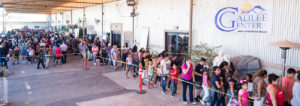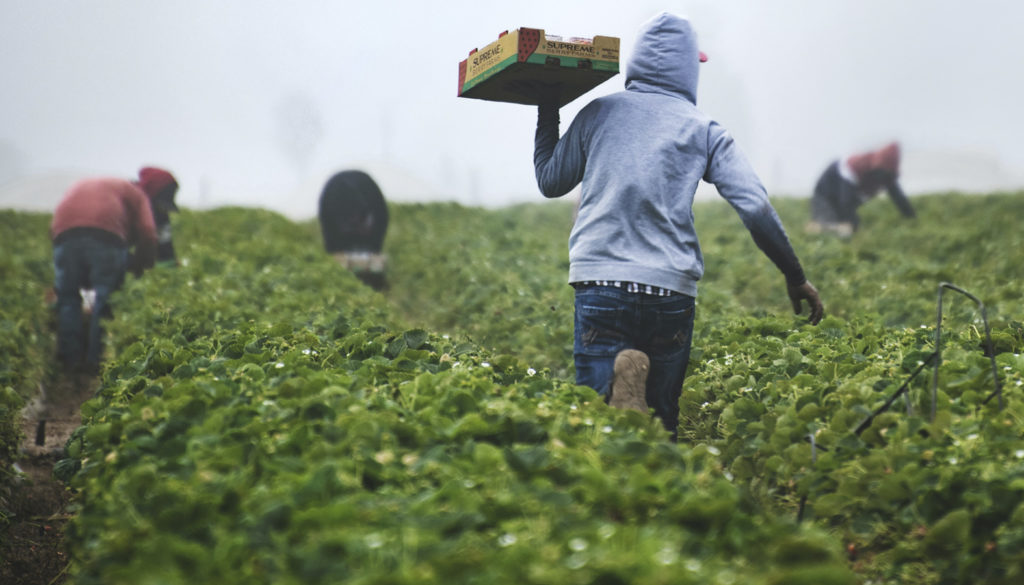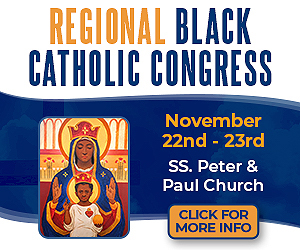To the world, Coachella Valley is the site of the massive, internationally touted music and arts festival held each year in the desert outside Palm Springs.
But Coachella is an actual town. And along with the neighboring unincorporated community of Mecca, it’s home to tens of thousands of seasonal farm workers, cleaners, tree trimmers, garbage collectors, and hotel staff: the unseen army of people, most from Mexico and Central America, many undocumented, who provide the infrastructure that allows those who live in and visit the valley to eat, holiday, and earn.
“Invisible Valley,” a 2021 documentary directed by Aaron Maurer, profiles the Galilee Center, a Mecca-based nonprofit whose mission is to help provide the workers with food, shelter, clothing, and housewares.
“These are the working poor,” says Gloria Gomez, president and cofounder. “The life is seasonal and precarious. The community comes and goes.”
Gloria was born in a mud hut in a Mexican village, came to the States at the age of 7, and worked in the fields with her parents. She and Claudia Castorena, CFO and cofounder of the Galilee Center, met in 1989.
Says Claudia: “We are consecrated laywomen. We’ve taken private or informal vows of poverty, chastity, and obedience to the Church. We have been committed for 34 years. Our former Bishop Gerald Barnes and current Bishop Alberto Rojas know of us and support our work.”
In the space of a couple of hundred square miles and nine cities, the state of California’s highest and lowest per capita incomes can be found. The winter “snowbirds” clear out in the summer heat for their second (or third) homes. The Palm Springs area boasts more private jets than commercial airlines.
As Mary, seasonal resident of an upscale condo — and longtime Galilee Center volunteer — notes: “Take a left out of that gate instead of a right, and it’s a different world.”

Approximately 75% of California’s farmworkers are undocumented. National Labor Relations Laws (NLRA) do not apply to farmworkers, nor do many Fair Labor Standards Act (FLSA) protections, including most minimum wage guarantees, overtime pay, and mandatory breaks for rest and meals.
“We know that when the cards were dealt, they were on us,” says Maricela, a married farmworker who struggles to make ends meet and to build a better world for her two daughters.
For her and many other mothers, the dream is to save enough from their meager salary so that they can stay with their children all year round, rather than having to leave them with caretakers as they go north to work other harvests.
Much of the farm work is stoop labor, notoriously brutal on the spine and legs. Date harvesters climb trees that are 30-40 feet high. The upper branches sometimes harbor snakes. Thorns can penetrate boots and puncture fingers to the bone.
The workers often park their trucks in a lot and sleep in the back, including in summer where even at night desert temperatures can hover in the 90s.
The Center started out serving meals. Eventually they opened the valley’s first thrift shop, now colloquially known as the Walmart of Mecca. They opened a second shop in Coachella. “If people need it, we give it away for free,” says Gloria of the furnishings, clothing, and housewares.
Then they built a temporary shelter that boasted 100 beds. At first, no one came. “They’re terrified, 24/7, of ICE,” explains Gloria. “They’re afraid that if they avail themselves of any help, the authorities will come, arrest them, and send them back to Mexico.”
Still, the shelter is now full to overflowing, the center has become an unofficial overflow center for asylum-seekers, and the provided services continue to grow. They recently raised $2 million for an enlarged shelter, community room, warehouse, and other facilities.
The documentary’s underlying themes are that everything changes, and everything is connected.
The nearby Salton Sea, measuring 35 by 15 miles, is a haven for migratory birds, just as the Coachella Valley is a haven for migrating people.
Once promoted as the next big resort, a Palm Springs with water, the sea is drying up. As the shoreline recedes, tiny particles of toxins, pesticides, and arsenic-bearing sand will become airborne and affect the people of Southern California all the way to LA and beyond. Meanwhile, California accounts for a full 12% of the nation’s agricultural sales and grows by far the most produce of any state.
“I’m just a poor woman who wants to serve the poor and needy,” says Gloria. Adds Claudia: “We don’t pretend that the Galilee Center is a panacea. There’s so much more to do, so much more room to grow.”
“What is human dignity? How do we demonstrate the beauty of that human dignity?” asks Rep. Raul Ruiz, D.-Calif., 36th District. “Because you can express that, living in poverty. And that’s what you learn, living here in the streets of Coachella.”
Then there’s Maricela, to whom “Invisible Valley” is dedicated.
“I’m happy. I have my children and my mother. What else could you ask for?”
“Why hold on to things?” she adds. “Give everything you have. You won’t take anything with you. Nada. I ask my girls, ‘Why keep that sweater?’ There are many people who are cold who can use it now, not later.”

